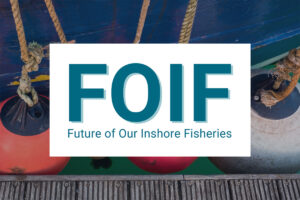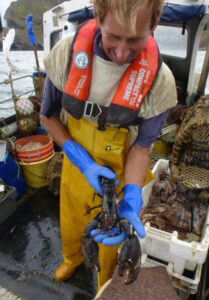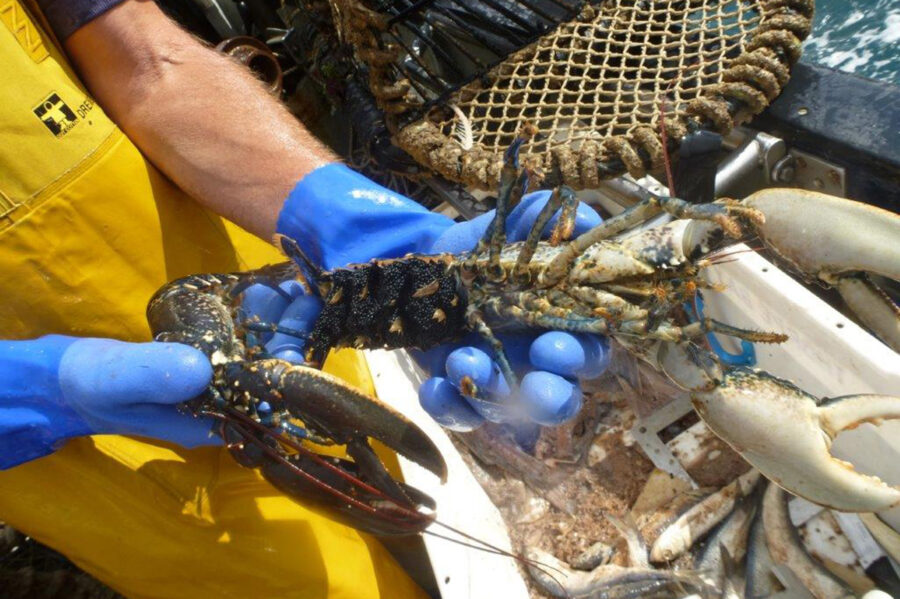At last year’s Fisheries Management Plan stakeholder engagement events, fishers and seafood businesses worked with regulators to chart the future direction of shellfish management – and key themes emerged to guide the next stage of the process
BY AOIFE MARTIN Director of operations at Seafish and chair of the Whelk Management Group
Last autumn, fishers around the coast had their say on the draft objectives of the first tranche of Fisheries Management Plans (FMPs) for crab, lobster, whelk and king scallop in England and Wales.
A team from Seafish and the Scallop Industry Consultation Group (SICG) travelled the shores of the UK, from Bridlington to Bangor to Newlyn, hosting a series of in-person and online stakeholder workshops.

Their goal? To learn what matters to fishers, regional managers in Inshore Fisheries and Conservation Authorities, non-governmental organisations and businesses along the seafood supply chain when it comes to the management of shellfish stocks, and to get their feedback on the initial work underway to transform this process.
“FMPs put industry in a unique position to really influence the direction which individual fisheries and species take – enabling management to be more responsive and adaptive than was previously possible under the Common Fisheries Policy,” explained Juliette Hatchman from the South Western Fish Producers’ Organisation.
“For example, the SICG working group is an industry-led co-management group that has had sole responsibility for developing objectives for the king scallop FMP in English and Welsh waters, putting the scallop industry at the centre of fisheries management decisions.”
Over 530 people from across the crab, lobster, whelk and king scallop supply chains attended the Seafish-led stakeholder engagement events from September to December 2022, including fishers, processors, researchers, regulators and environmental NGOs.
Seafish shellfish fisheries analyst Rebecca Treacy said: “Getting everybody in the same room to input on the draft objectives of the shellfish FMPs, and consider possible management options for these species, was invaluable.
“The objectives range from broad, shared principles across shellfish fisheries, such as promoting trade opportunities, to species-specific objectives, such as improving data collection for king scallops and whelk, and strengthening existing methods of assessing crab and lobster stock status.”
So what were the common themes that emerged during these meetings, and what changes to shellfish management does the industry want to see?
1) Strong support for improved shellfisheries management
There was widespread acknowledgment around the coast of the need for stronger evidence- based management of crab, lobster and whelk stocks. For king scallops, it was felt that existing scallop management is overly complex, and that the FMP should aim to simplify the process.
2) Industry-led science and data collection should be championed
To support a more effective management system, stakeholders highlighted the need for improved data collection across crab, lobster, whelk and king scallop fisheries. It was felt that more emphasis should be placed on utilising data collected through research partnerships with industry, thus forging connections between skippers and researchers.
3) Collaborative management will be critical
Attendees at the engagement events also showed a strong appetite for collaborative management, in which the industry and regulators work closely together. Stronger engagement with industry-led forums such as the Crab and Lobster Management Group, Whelk Management Group and SICG were seen as positive progress in this respect.
4) Promoting UK shellfish and facilitating trade are key
Stakeholders spoke of the need to facilitate trade and promote British shellfish to consumers both at home and abroad. Attendees recognised the importance of trade and marketing for achieving resilient fisheries.
5) There is apprehension about FMP ambitions
Some stakeholders shared concerns about the ambitiousness of the FMP programme, saying that ‘we have been here before’. However, they were reassured that both the Fisheries Act and the Joint Fisheries Statement have pledged to develop FMPs collaboratively.
6) Harmonisation of measures is supported
For lobster and crawfish, there was support for the harmonisation of some management measures, such
as minimum landing size. For king scallop, there was also agreement that harmonisation of regulations is a good idea, not just between administrations but also in using the FMP to look at opportunities for harmonisation between IFCA jurisdictions. Attendees stressed the importance of ensuring IFCA involvement throughout the FMP development process.
“A life on the water means that fishers have invaluable experience and knowledge of the species they target – they are vital to understanding what is happening beneath the surface,” said head of fisheries management at Seafish Lewis Tattersall.
“A true partnership approach between fishers, researchers and policy-makers is key for the successful future management of UK fisheries, and specifically in the development of the FMPs. The stakeholder feedback we received during the meetings has allowed us to come to the table with better, stronger priorities that reflect what the industry wants to see.”
The draft crab, lobster, whelk and king scallop FMPs are currently being prepared for public consultation, which will launch in summer. Defra and partners, including Seafish, are planning both in-person and online events to promote and support stakeholder engagement with the consultation.
Voice from the industry: Inshore fisherman John Balls
Seafish asked John Balls, an inshore fisherman from Clovelly in North Devon and chair of the North Devon Fishermen’s Association, for his reflections on shellfisheries management and the FMP process so far.
“I attended an engagement event on crab, lobster and whelk FMPs last November in Ilfracombe, alongside 10 or so local fishermen,” he said. “I think my fellow fishermen were sceptical and nervous about the meeting beforehand, but we had a very rational discussion with Seafish.
“The fishermen left that meeting with a deeper recognition that the way we manage our shellfish stocks has to change if we are going to sustain them for the future. We all appreciated that there is a need for rules and regulations to be put in place, which is why it is important that we as fishermen are on the front foot and put our ideas and views forward as often as we can.”

John Balls with a prime lobster caught off Hartland Point in North Devon.
Asked for his thoughts on the status of inshore shellfisheries, John reflected: “There are now very few seasonal inshore fisheries, which means shellfish are being targeted 12 months of the year.
“When I was growing up in Norfolk, we used to target different species in different seasons according to when they were abundant, and this varied from region to region. From a conservation standpoint, this also allowed each species to recover in between fishing seasons.
“Speaking from an inshore fisherman’s perspective, if you’re going to create an FMP that addresses these issues, one size doesn’t fit all – you’ve got to get the IFCAs and inshore fishermen onboard, and consider regional differences. The IFCAs are the first line of management in the inshore zone.
“I speak to fishermen all over, and no matter whether they are on the east coast of England or in the South West, everybody agrees there are too many pots on the ground. More gear is being turned over on a daily basis, and as a result, catches on the inshore grounds have declined. This drives people to start putting even more gear in the water solely to make a day’s pay, which, in the grand scheme of things, doesn’t solve anything.
“I think regulators have started to realise this now. Quota management is being looked at by very sensible people within Defra. We’ve got some good ears listening to the plight of the industry. I think we’re now starting to move in the right direction.”
“A big personal concern of mine as an inshore fisherman is the landing of low-quality, soft- shelled brown crab for whelk bait. Poor-quality crab should never be landed, in my opinion. If they were returned to the sea and given time to feed and grow, they would soon become high- quality crabs that could be sold for human consumption.
“I was pleased to learn recently that this issue will be included in the crab and lobster FMP, after fishermen brought the issue to the attention of Seafish.” When asked if he is optimistic about the future of UK fisheries management, John replied: “Yes, I am optimistic – as long as inshore fishermen and the IFCAs are involved, which is starting to happen more and more.
“In recent years, managers have realised the need to start giving something back by including fishermen in management decisions. This can only lead us to a positive overall outcome for the fishing industry.”
This story was taken from the latest issue of Fishing News. For more up-to-date and in-depth reports on the UK and Irish commercial fishing sector, subscribe to Fishing News here or buy the latest single issue for just £3.30 here.
Sign up to Fishing News’ FREE e-newsletter here.








